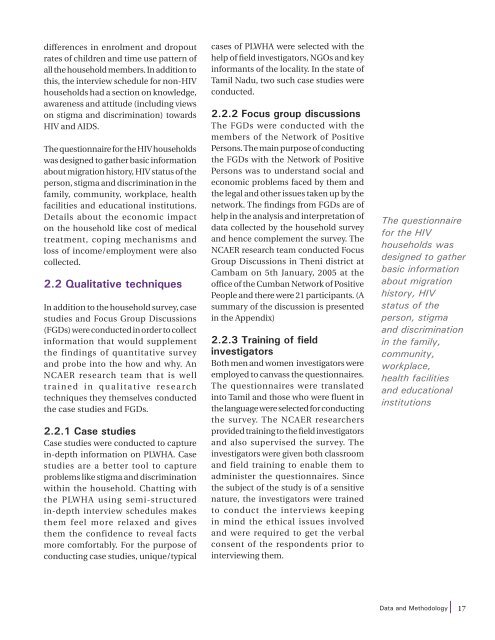Socio-Economic Impact of HIV and AIDS in Tamil nadu
Socio-Economic Impact of HIV and AIDS in Tamil nadu
Socio-Economic Impact of HIV and AIDS in Tamil nadu
Create successful ePaper yourself
Turn your PDF publications into a flip-book with our unique Google optimized e-Paper software.
differences <strong>in</strong> enrolment <strong>and</strong> dropout<br />
rates <strong>of</strong> children <strong>and</strong> time use pattern <strong>of</strong><br />
all the household members. In addition to<br />
this, the <strong>in</strong>terview schedule for non-<strong>HIV</strong><br />
households had a section on knowledge,<br />
awareness <strong>and</strong> attitude (<strong>in</strong>clud<strong>in</strong>g views<br />
on stigma <strong>and</strong> discrim<strong>in</strong>ation) towards<br />
<strong>HIV</strong> <strong>and</strong> <strong>AIDS</strong>.<br />
The questionnaire for the <strong>HIV</strong> households<br />
was designed to gather basic <strong>in</strong>formation<br />
about migration history, <strong>HIV</strong> status <strong>of</strong> the<br />
person, stigma <strong>and</strong> discrim<strong>in</strong>ation <strong>in</strong> the<br />
family, community, workplace, health<br />
facilities <strong>and</strong> educational <strong>in</strong>stitutions.<br />
Details about the economic impact<br />
on the household like cost <strong>of</strong> medical<br />
treatment, cop<strong>in</strong>g mechanisms <strong>and</strong><br />
loss <strong>of</strong> <strong>in</strong>come/employment were also<br />
collected.<br />
2.2 Qualitative techniques<br />
In addition to the household survey, case<br />
studies <strong>and</strong> Focus Group Discussions<br />
(FGDs) were conducted <strong>in</strong> order to collect<br />
<strong>in</strong>formation that would supplement<br />
the f<strong>in</strong>d<strong>in</strong>gs <strong>of</strong> quantitative survey<br />
<strong>and</strong> probe <strong>in</strong>to the how <strong>and</strong> why. An<br />
NCAER research team that is well<br />
t r a i n e d i n q u a l i t a t i v e re s e a rc h<br />
techniques they themselves conducted<br />
the case studies <strong>and</strong> FGDs.<br />
2.2.1 Case studies<br />
Case studies were conducted to capture<br />
<strong>in</strong>-depth <strong>in</strong>formation on PLWHA. Case<br />
studies are a better tool to capture<br />
problems like stigma <strong>and</strong> discrim<strong>in</strong>ation<br />
with<strong>in</strong> the household. Chatt<strong>in</strong>g with<br />
the PLWHA us<strong>in</strong>g semi-structured<br />
<strong>in</strong>-depth <strong>in</strong>terview schedules makes<br />
them feel more relaxed <strong>and</strong> gives<br />
them the confidence to reveal facts<br />
more comfortably. For the purpose <strong>of</strong><br />
conduct<strong>in</strong>g case studies, unique/typical<br />
cases <strong>of</strong> PLWHA were selected with the<br />
help <strong>of</strong> field <strong>in</strong>vestigators, NGOs <strong>and</strong> key<br />
<strong>in</strong>formants <strong>of</strong> the locality. In the state <strong>of</strong><br />
<strong>Tamil</strong> Nadu, two such case studies were<br />
conducted.<br />
2.2.2 Focus group discussions<br />
The FGDs were conducted with the<br />
members <strong>of</strong> the Network <strong>of</strong> Positive<br />
Persons. The ma<strong>in</strong> purpose <strong>of</strong> conduct<strong>in</strong>g<br />
the FGDs with the Network <strong>of</strong> Positive<br />
Persons was to underst<strong>and</strong> social <strong>and</strong><br />
economic problems faced by them <strong>and</strong><br />
the legal <strong>and</strong> other issues taken up by the<br />
network. The f<strong>in</strong>d<strong>in</strong>gs from FGDs are <strong>of</strong><br />
help <strong>in</strong> the analysis <strong>and</strong> <strong>in</strong>terpretation <strong>of</strong><br />
data collected by the household survey<br />
<strong>and</strong> hence complement the survey. The<br />
NCAER research team conducted Focus<br />
Group Discussions <strong>in</strong> Theni district at<br />
Cambam on 5th January, 2005 at the<br />
<strong>of</strong>fice <strong>of</strong> the Cumban Network <strong>of</strong> Positive<br />
People <strong>and</strong> there were 21 participants. (A<br />
summary <strong>of</strong> the discussion is presented<br />
<strong>in</strong> the Appendix)<br />
2.2.3 Tra<strong>in</strong><strong>in</strong>g <strong>of</strong> field<br />
<strong>in</strong>vestigators<br />
Both men <strong>and</strong> women <strong>in</strong>vestigators were<br />
employed to canvass the questionnaires.<br />
The questionnaires were translated<br />
<strong>in</strong>to <strong>Tamil</strong> <strong>and</strong> those who were fluent <strong>in</strong><br />
the language were selected for conduct<strong>in</strong>g<br />
the survey. The NCAER researchers<br />
provided tra<strong>in</strong><strong>in</strong>g to the field <strong>in</strong>vestigators<br />
<strong>and</strong> also supervised the survey. The<br />
<strong>in</strong>vestigators were given both classroom<br />
<strong>and</strong> field tra<strong>in</strong><strong>in</strong>g to enable them to<br />
adm<strong>in</strong>ister the questionnaires. S<strong>in</strong>ce<br />
the subject <strong>of</strong> the study is <strong>of</strong> a sensitive<br />
nature, the <strong>in</strong>vestigators were tra<strong>in</strong>ed<br />
to conduct the <strong>in</strong>terviews keep<strong>in</strong>g<br />
<strong>in</strong> m<strong>in</strong>d the ethical issues <strong>in</strong>volved<br />
<strong>and</strong> were required to get the verbal<br />
consent <strong>of</strong> the respondents prior to<br />
<strong>in</strong>terview<strong>in</strong>g them.<br />
The questionnaire<br />
for the <strong>HIV</strong><br />
households was<br />
designed to gather<br />
basic <strong>in</strong>formation<br />
about migration<br />
history, <strong>HIV</strong><br />
status <strong>of</strong> the<br />
person, stigma<br />
<strong>and</strong> discrim<strong>in</strong>ation<br />
<strong>in</strong> the family,<br />
community,<br />
workplace,<br />
health facilities<br />
<strong>and</strong> educational<br />
<strong>in</strong>stitutions<br />
Data <strong>and</strong> Methodology<br />
17
















